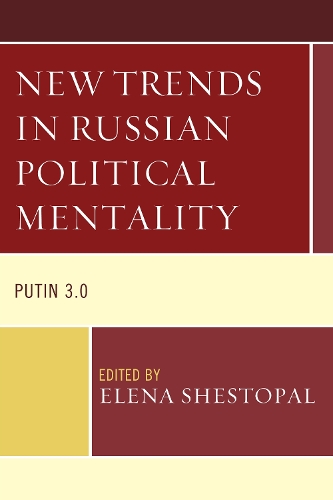
New Trends in Russian Political Mentality: Putin 3.0
(Hardback)
Available Formats
Publishing Details
New Trends in Russian Political Mentality: Putin 3.0
By (Author) Elena Shestopal
Contributions by Svetlana Akhmatnurova
Contributions by Ignat Bogdan
Contributions by Natalia Bokova
Contributions by Olga Bukreeva
Contributions by Angela Cherdanzeva
Contributions by Svyatoslav Davydov
Contributions by Cristina Dzhagamadze
Contributions by Yakovleva Elena
Contributions by Lira Gazizova
Bloomsbury Publishing PLC
Lexington Books
17th December 2015
United States
Classifications
Tertiary Education
Non Fiction
European history
320.947090512
Winner of Russian Association for Political Science (RAPN) Book Prize 2016 "The integration into the world science" - Diploma of 1st Degree.
Physical Properties
Hardback
414
Width 159mm, Height 234mm, Spine 35mm
767g
Description
This book examines recent political and psychological changes in Russian society during Vladimir Putins third term. Instability in 20112012 and new domestic and international contexts make this a unique period in the post-Soviet political history of Russia. This volume focuses on popular perceptions of Russian politics during a new electoral cycle, in particular views of political power, institutions, and leaders. The contributors to this collection describe, and interpret recent political trends in Russian society by utilizing unique methodologies used for over twenty years, allowing results to be compared over time.
Reviews
Shestopal joins a number of fellow Russian scholars who have been studying Russian political mentality since 1993. The volume's coverage focuses on the period 201114. The book offers insight into how Russians perceive the contemporary Russian state, Russia's parliament, and Russian political parties. The contributors pay significant attention to various Russian leaders and representatives of the opposition. Their analyses of the dynamics of Vladimir Putin's image from 2000 until 2015 is of interest to those who follow his lengthy tenure as the strongman of Russia. The authors also assess those who competed with Putin in the 2012 presidential elections in Russia, such as Gennady Zyuganov, Vladimir Zhirinovsky, Mikhail Prokhorov, and Sergey Mironov. Other topics covered include images of regional leaders and political leaders of the country's parliament. Shestopal and her colleagues help in understanding the connections between state and society in Russia. Overall, a useful addition to the literature on modern Russia. Summing Up: Recommended. Upper-division undergraduates and above. * CHOICE *
The strength of this book is found in those sections in which she engages in qualitative research. * VoegelinView *
The arrival of the book New Trends in Russian Political Mentality edited by Elena Shestopal is an important event for the study of contemporary Russian politics and society. This essential volume authored by Russias leading sociologists focuses on the particularities of public opinion, political thought, and ideology in Russia during the Putin era. . . The discussion provides important foundations for interpreting the political situation in contemporary Russia for political scientists and public opinion makers in the west. . . . this book is essential reading for all interested audiences, including advanced students of Russia, policy makers, and public opinion shapers. It is a contribution that provides a refined and politically-nuanced picture of Russian society based on sophisticated theoretical analysis and elaborate sociological research. * Slavic Review *
Even after two decades at the pinnacle of Russian public life, Vladimir Putin remains an enigma. This collection of impressive studies is an important contribution to unravelling the mystery. Building on powerful previous studies, Elena Shestopal and her fellow scholars trace the recent changes in public perceptions of Putin and the Russian elite as a whole. Both the power system and Putin have entered perilous new waters. Although Russian society today is more consolidated than before and there is a sense that the earlier time of troubles of the 1990s is over, relations between Russias leaders and societies remain fraught. This book provides a psychological portrait of state and society at this time of change, providing a powerful, original, perceptive, and convincing analysis of state-society relations in contemporary Russia. -- Richard Sakwa, University of Kent
As the clouds of a renewed Cold War seem to be gathering, this book is a welcome contribution from the very active political psychology research program at Moscow State University. Focusing on how people in Russia sense and implicitly represent political realities, the book uses the concept of image to chart Russians perceptions of power and authority, leaders and opposition, and institutions, and shows how these perceptions have changed over the years of Putins presidencies. One very important message is that todays Russians arent the same as Soviets. Americans ignore this difference at their own peril, and so one hopes this book will influence academic and policymaking circles as well as concerned citizens who want to understand the evolving Russia-U.S. relationship. -- David G. Winter, University of Michigan
Quite remarkable in its analytical depth and presentation of vast sociological evidence, this book offers unique insight on Russian peoples opinions of their leaders, their institutions, and the Kremlins policies. It is almost indispensable reading to understanding Russias behavior domestically and internationally. Edited by Elena B. Shestopal, the key scholar on Russian political psychology, this book has no match in the existing literature in providing rich empirical evidence of how society is changing from essentially materialistic to post-materialistic values, where justice and safety trump material expectations and demands from politicians. I hope that all those who seek to understand modern Russia will read this book and thereby avoid the simplifications and clichs prevalent in many western approaches to Russia. -- Piotr Dutkiewicz, Carleton University
Author Bio
Elena Shestopal is professor and chair of the Department of Sociology and Psychology at Moscow State University.
